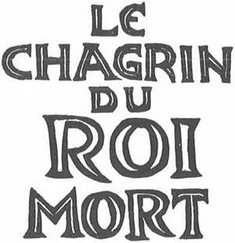Jean-Claude Mourlevat - Winter's End
Здесь есть возможность читать онлайн «Jean-Claude Mourlevat - Winter's End» весь текст электронной книги совершенно бесплатно (целиком полную версию без сокращений). В некоторых случаях можно слушать аудио, скачать через торрент в формате fb2 и присутствует краткое содержание. Год выпуска: 2010, ISBN: 2010, Издательство: Candlewick, Жанр: Старинная литература, на английском языке. Описание произведения, (предисловие) а так же отзывы посетителей доступны на портале библиотеки ЛибКат.
- Название:Winter's End
- Автор:
- Издательство:Candlewick
- Жанр:
- Год:2010
- ISBN:9780763651749
- Рейтинг книги:5 / 5. Голосов: 1
-
Избранное:Добавить в избранное
- Отзывы:
-
Ваша оценка:
- 100
- 1
- 2
- 3
- 4
- 5
Winter's End: краткое содержание, описание и аннотация
Предлагаем к чтению аннотацию, описание, краткое содержание или предисловие (зависит от того, что написал сам автор книги «Winter's End»). Если вы не нашли необходимую информацию о книге — напишите в комментариях, мы постараемся отыскать её.
Winter's End — читать онлайн бесплатно полную книгу (весь текст) целиком
Ниже представлен текст книги, разбитый по страницам. Система сохранения места последней прочитанной страницы, позволяет с удобством читать онлайн бесплатно книгу «Winter's End», без необходимости каждый раз заново искать на чём Вы остановились. Поставьте закладку, и сможете в любой момент перейти на страницу, на которой закончили чтение.
Интервал:
Закладка:
Paula nodded.
“You know what we’ll do now, Paula? We’ll go upstairs to the bedroom. You’ll sleep in your own bed and I’ll sleep in Octavo’s. And tomorrow we’ll both catch the bus and go to join them in the capital. I’ll take care of you. Don’t worry about anything. I love you as if you were my mother, you know I do. You’re the only mother I ever knew.”
The consoler nodded again, and buried her face against the breast of the girl who had knocked on her door for the first time four years earlier — the girl she had described as a little, lost kitten at the time.

Milos kept looking for the jay through the week before he left the training camp. It was all very well trying not to be superstitious, but he couldn’t help hoping that the big, brightly colored bird would reappear and bring him luck. Every morning and late every afternoon he went around behind the infirmary to where he had seen the jay in autumn, but it never turned up on the windowsill, on the other side of the bars, or anywhere else. Milos felt it was a bad omen.
He wasn’t the only one watching out for signs. One of the premiers fell into a furious rage because someone else went to sit in his usual place in the refectory. He picked up the bench, tipping the other man off it, and laid into him with his fists shouting, “Want to get me killed, do you? That’s it — you want to get me killed, you bastard!” It took two other men to separate them.
Their training had taken a more violent turn for some time past. As the fights came closer, the gladiators seemed to be trying to toughen themselves up even more, to shake off any weakness. On their last night in the camp, Myricus summoned them all to the arena after their evening meal. There were no floodlights on, but torches fixed to logs of wood cast red light on their somber faces. The men moved away from each other and stood motionless, swords in their hands. Myricus walked slowly among them, then went up to the gallery and addressed them in his deep voice.
“Gentlemen, look around you. Look at one another, all of you: Caius, Ferox, Delicatus, Messor . . .”
He listed all thirty names without omitting a single one, taking his time about it. That grave recitation instantly conveyed a disturbing solemnity.
“Take a good look at each other, because in a few days’ time, when I call you together again in this place, many of you will be dead. So look at one another now.”
There was an oppressive silence. All the gladiators kept their eyes focused on the sand. None of them lifted their heads when Myricus told them to look up.
“At this moment, as I speak to you,” the trainer went on, “the gladiators in the other five camps are listening to a similar address. Like you, they are surrounded by torches, and every one of them is wondering: Will I be among the dead or will I survive? I tell the novices among you, and I repeat it for the benefit of the others: hatred is your only weapon. Hate your opponent as soon as you see him appear on the other side of the arena. Hate him in advance for wanting to take your life. And make sure you’re convinced that his life is not worth yours.”
He paused. The gladiators remained silent, deep in the turmoil of their own thoughts. A little way ahead of him, Milos saw the shaved nape of Basil’s neck and his massive shoulders rising and falling to the regular rhythm of his breathing. He took comfort from the sight, and then he wondered which of the two of them would fight first. He prayed that it would be him, not Basil.
Myricus went on speaking for some time. He conjured up the names of the great gladiators of classical antiquity: Flamma, who had won thirty fights; Urbicus, a winner thirteen times, and then defeated because he held back from striking the mortal blow and gave his unfortunate opponent a chance.
“We set out tomorrow,” he concluded. “Leave your swords here on the ground. You won’t be needing them during the journey. We’ll collect them and give them back to you when the time comes for you to fight.”
That night was not disturbed by any nightmares. An unreal calm reigned in the dormitories. Probably none of them really slept. Every time Milos thought he was dropping off, he gave a start and was wide awake again, as if he were determined not to sleep away any of the hours that might be his last. Basil couldn’t sleep either.
“What’s your girlfriend’s name?” he asked in the middle of the night.
“Helen,” Milos whispered.
“What?”
“Helen.” He had to repeat it in a louder voice, and it felt like speaking to her in the silence.
“What’s she like?”
“Well . . . normal.”
“Come on,” Basil insisted. “You can tell me. I won’t repeat it.”
“Right,” said Milos, slightly embarrassed. “She isn’t very tall, she has short hair, her face is rather round . . .”
These general remarks weren’t enough for Basil. “Tell me something special — oh, I don’t know, something she does well.”
“She . . . well, she’s good at climbing a rope.”
“There we are, then!” said the young horse-man, satisfied, and he turned over.
Next morning, the camp gates opened, and three military vans drove in and stopped outside the canteen, followed by two tarpaulin-covered trucks full of armed soldiers. The gladiators were assembled in the wind and drizzling rain. It was Fulgur’s job to divide them into groups and handcuff them to chains linking them together. He did it with perverse pleasure, scanning their faces for signs of fear. Milos did his best to hide his emotions, but his sickly, pale face gave him away, and when Fulgur gave him a meaningful wink, as if to say, Got the jitters, have you? it was all he could do not to rush the man and headbutt him.
He looked desperately for the jay until the last moment. Please come back! Let me see you! Just for a second. Let me see you one last time, and I’ll take your bright image away with me, the image of life!
He had to be pushed to make him climb into the van.
Fulgur had taken care to separate him from Basil. He was put in the second van with a number of others, and sat on one of the wooden benches running around the sides. The convoy set off and drove out of the camp, with one of the trucks full of soldiers going ahead and the other bringing up the rear. Any attempt to escape would have been sheer suicide. A small barred window had been cut in the side of the van, and for a long time they saw the complex pattern of the bare branches of oak trees moving up and down past them. Around midday they finally left the forest, joined the main road, and drove south toward the capital.
A little later a bus with a noisy engine coming from the north overtook the convoy, which was driving slowly. When it drew level with the second van, the two vehicles went along the road side by side for about fifty yards. Paula was sleeping at the back of the bus, her hands on her knees. Her large posterior occupied two whole seats. Beside her, in a seat by the window, Helen was trying to read. She raised her eyes and looked absently at the van carrying Milos, handcuffs on his wrists, his heart heavy.
For a few seconds there were no more than ten feet between the two. Then the bus accelerated and parted them again.
The convoy reached its destination in the middle of the night. Those of the gladiators who had never been in the capital before pressed their faces in turn to the little barred window, but all they saw of the great city was the facades of dismal gray buildings. When they got out of the vans, they all shivered in the damp cold of the night. The headlights of the vehicles, now maneuvering to leave again, swept across the base of an enormous, dark structure: the arena. So this was the end of their journey. Their last journey?
Читать дальшеИнтервал:
Закладка:
Похожие книги на «Winter's End»
Представляем Вашему вниманию похожие книги на «Winter's End» списком для выбора. Мы отобрали схожую по названию и смыслу литературу в надежде предоставить читателям больше вариантов отыскать новые, интересные, ещё непрочитанные произведения.
Обсуждение, отзывы о книге «Winter's End» и просто собственные мнения читателей. Оставьте ваши комментарии, напишите, что Вы думаете о произведении, его смысле или главных героях. Укажите что конкретно понравилось, а что нет, и почему Вы так считаете.












